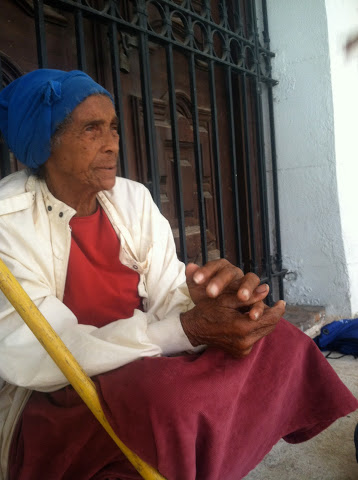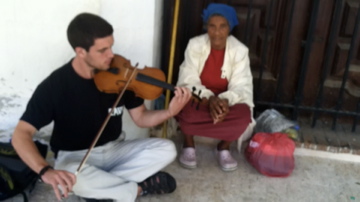American missionary befriends homeless in the mean streets of Santo DomingoSince last August, I have been volunteering in the Dominican Republic, helping to establish a Catholic Worker community in Santo Domingo. I began my sojourn here soon after graduating from the University of Dallas with a major in economics, history and Spanish.
I’m working with Felix Cepeda, a former Jesuit seminarian. Our primary mission is to give the poor hope and to remind them that they are not alone and that they are in fact loved. The method by which we hope to achieve this is twofold:
• Establish relationships with several clusters of homeless in the city through music, prayer and, most importantly, food.
• Open a House of Hospitality in the city to supply the homeless with a place to rest, bathe and converse.
Our near-term goal is to open the home as a safe oasis and a base of operations, but we pray that we will soon receive the funds to enable several of the elderly to reside in the home permanently.
We visit 40 homeless people twice a day. Today and tomorrow, I’d like to introduce you to two of them.
Nearly six months have passed since I met Esperanza. I remember our first encounter vividly. It was around 6 p.m. in late August and the 76-year-old lady was sitting down, in what appeared to be a very uncomfortable position, on the corner of the street called El Conde in the Colonial Zone of Santo Domingo. Her head was down and her eyes were shut, but, as I would soon learn, she was most certainly awake. As I approached her, I was struck by both the number of flies swarming around her, as well as her apparent indifference to their presence. Aside from the fact that she was homeless and the locals referred to her as Esperanza, I knew nothing about her.
I recited a quick prayer in my head, and then sat down next to her and introduced myself, “Hello, my name is David Janicki, how is your day going?”
No response, not even a slight lift of her head to acknowledge that someone had just spoken to her. I continued, “I am volunteering here in the DR for roughly a year. I am part of the Catholic Worker Movement and our mission is to create a community for the homeless here in the capital.”
Again, no response. Discouraged, I gently placed my hand on her shoulder and said, “Well I’m going to be coming by here every day. Have a wonderful evening, and may God bless you.”
Upon hearing those words, she lifted her head and looked me in the eyes. I was shocked at what I saw. Her face was hardened and worn, and her eyes bore the weight of over 15 years of suffering and pain. I instantly knew then that those eyes had seen the very worst of humanity. She whispered back to me, “Vaya con Dios (Go with God).” Unable to conjure up a response, I simply nodded to her, stood up and walked away.

Over the next two weeks, fellow Catholic Worker Felix Cepeda and I met with Esperanza daily, bringing her food and trying in vain to generate some sort of dialogue with her. Initially, our visits were very short and anything but fruitful. I learned quickly that Esperanza did not trust anyone, and, as several of her past experiences would later become known to me, I realized that such distrust was more than warranted.
On the second Friday of this two week trial, in an attempt to connect with her hardened and well defended heart, I decided to bring my guitar with me. Before I even had a chance to say anything to her she surprised me by saying, in a very matter of fact tone, “If the song is not about Jesus, I don’t want to hear it.”
I smiled and replied, “Lucky for us, those are the only types of songs I know…unfortunately this song is in English, but I will explain the meaning of it to you before I sing it.”
After explaining the theme of the song, I played it for her. During the final verse, a very beautiful and frightening moment occurred, which caused me to botch the end of the song and left me in a speechless and blissful state. As I sang the final verse, Esperanza shouted, “Gloria a Dios (Glory to God)!” and then smiled.
Now, I have seen many beautiful smiles in my 24 years, but there was something different about this smile, something very majestic and profound. Nothing about her reaction was forced; the smile was completely natural, and almost instinctual. While she smiled I was able to glimpse, albeit for a brief moment, into the depths of her wonderful heart. What I saw sent chills to the very core of my being and, without wanting to, I was forced to look away because in that instant I saw the face of Christ. As quickly and mysteriously as this happened, the moment passed and the suffering and pain returned to the solemn face of Esperanza.

That evening with Esperanza proved to be a pivotal moment for Felix and me. The song I played her is titled “Ashes,” one of my favorite hymns composed by Tom Conry. The song chronicles the internal struggle we all face as servants of God and reassures the listener of God’s everlasting love and mercy.
We rise again from ashes, from the good we’ve failed to do. We rise again from ashes to create ourselves anew, and if all the world were ashes, then must our lives be true. An offering of ashes is an offering to you.
From that moment on, Esperanza slowly began to trust us and she cautiously began to share with us a few of the very unfortunate and sad stories of her past. Her only brother had passed away over 20 years ago and she had no living family. She lost the little she owned when Hurricane George decimated her entire community in September 1998 and she has been living on the streets of the Colonial Zone ever since.
Her distrust for people stems from her experience in the streets. Given her fragile state, as well as her circumstances which led to her being homeless, i.e., through no fault of her own, many tourists and wealthy Dominicans give Esperanza money, and this fact is known among the people of the Colonial Zone. As a result, she has been robbed six times. I remember asking her one afternoon if she ever went to the local Foodbank a few miles away from the corner where she lives. She replied, “I went there once, bringing with me my backpack filled with the few possessions I had. While waiting in the long line, another homeless man threw me down, took my backpack, and ran off…I have never gone back since.” I was once again at a loss for words and quickly changed the subject.
As the weeks turned to months, Esperanza and I grew very close and I began to see, through her trials and sufferings, how much Christ loved her and how vividly present he was in her heart. She called me her grandchild, a title I wore with great honor, and always greeted me with that beautiful smile and a surprisingly strong hug. She was always looking out for me and making sure I ate well.
“What have you eaten today, have you been drinking lots of water?” she would invariably ask. She seemed to enjoy hearing me tell her about the new Dominican foods I tried. I have never been a very picky person, so I always told her, “The food here is the best in the world! So rich, so delicious, I love it so much.”
One morning after hearing this response she shot me one of her lovely smiles and asked, “David, what don’t you love?” Such interactions became the highlight of so many of my days.
Although I sympathized greatly with what Esperanza had been through, her persistent distrust for people became a major problem for Felix and me. Every single person we saw or met was not to be trusted. According to Esperanza, they either were thieves or drug addicts. Even the other homeless people living in the Colonial Zone, whom we visited regularly, were unable to escape the harsh judgment of Esperanza. This proved particularly difficult for our mission because our long-term goal is to open a House of Hospitality in Santo Domingo. However, Esperanza made it quite clear to us that she will only live in a house with us, and no one else. Even if it turned out that her judgments were unfounded, as they often proved to be, I was unable to foster any sort of hostility toward Esperanza because I knew that she was only trying to protect us.
In the short time I have known her, Esperanza has taught me many invaluable life lessons. Most notably among these is that Christ longs for an empty heart. Despite the fact that, materially, she has almost nothing, her heart is filled with joy and love. In short, her heart is filled with Christ. Although she is quite hesitant to place her trust in people, the same cannot be said for her faith and trust in the Lord. I often try to tell myself that every plan is simply a prayer to the Father. Esperanza embodies this sentiment. For her, every single action is predicated on the will of God. Less than two weeks ago, a group of Jehovah’s Witnesses approached me while I was talking with Esperanza. They told me that they had seen me around the Colonial Zone and wanted to know what I was doing here. After I explained our mission, they said, “That is so beautiful.” Then they pulled out their bibles and continued, “I am sure that during your ministry you come across people living on the street who blame God for their problems. Here are a few bible passages you should know in order to defend the Word against such claims.”
I turned to Esperanza, who politely asked me to translate what had just been said, and then looked back at them and smiled, “I have actually noticed the exact opposite. The people with nothing praise God in the most beautiful way. Although I do not wish to romanticize the concept of poverty, nor do I wish to imply that the homeless are perfect or without sin, but Christ most certainly is with them and I long for their faith.”
I went on to explain to them that I am fairly certain that Christ desires empty hearts because he is able to fill such hearts with His infinite love and mercy. The Jehovah’s Witnesses all gave me a puzzled look, combined with a forced smile, and then left. I looked back at Esperanza, who, still unsure as to what was just said, simply smiled at me. In that moment I once again saw the beautiful face of Christ and felt reassured in my assessment.
David Janicki is a Washington State native and graduate of the University of Dallas volunteering in the Dominican Republic with the Catholic Worker movement.
Tomorrow: Darnillo, the Suffering Servant.
